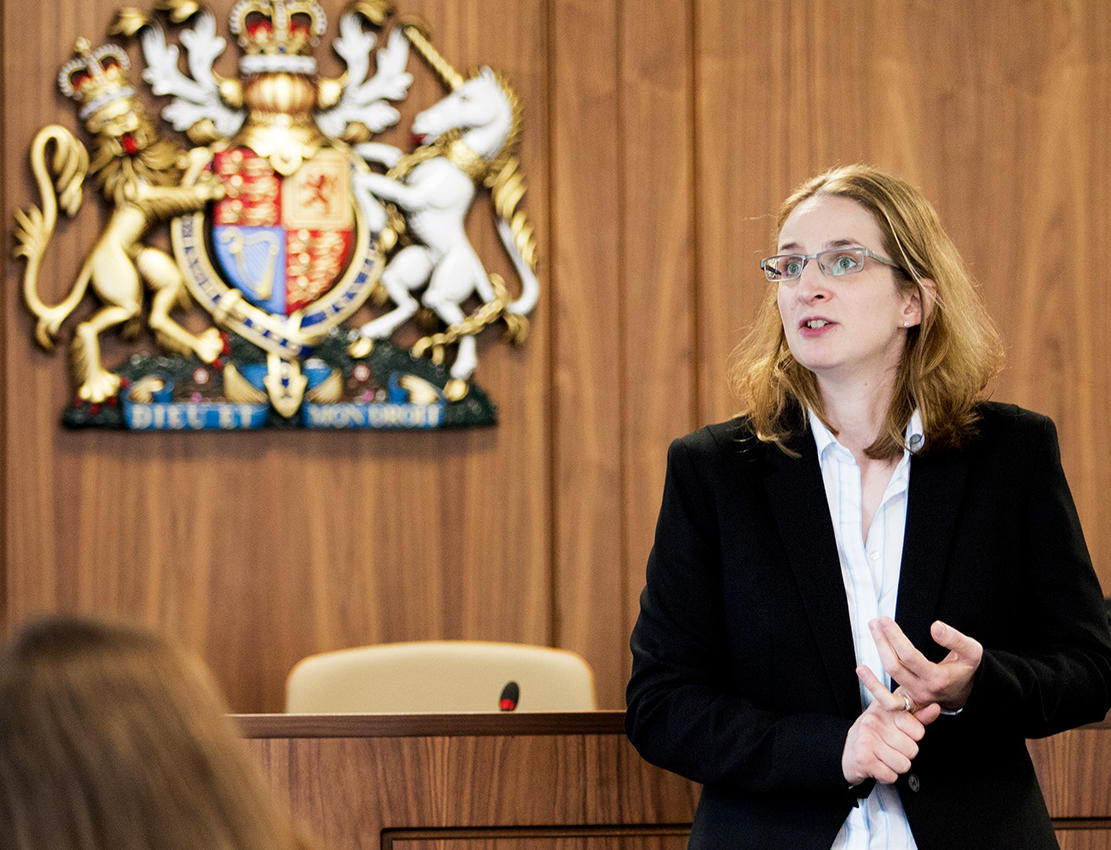You will be guided through your studies by dedicated experts who are committed to your learning and will support you throughout your studies. You will learn the skills required to be an expert in practice through our elective modules, and gain enhanced research skills through the Dissertation.
University of the Year finalist
Recognised for our graduate success, we’re shortlisted for University of the Year in the Times Higher Education Awards 2025.
Overview
Wherever you study law, it can be a challenging and rewarding subject. At Worcester, the big difference is the personal level of support we give you throughout your studies. In fact, we build our teaching around it. You will develop close working relationships with your lecturers in workshops, when role-playing court procedures in our superb courtroom facilities.
Delivered in partnership with the College of Legal Practice, this LLM in Legal Practice will prepare you for the Solicitors Qualifying Examination (SQE) as well as practice. The SQE modules are delivered online by the College of Legal Practice, making the course particularly attractive for those who want to work alongside their studies.
Our experienced and dedicated teaching team has excellent links with legal professionals, allowing you to learn about the law in context and gain invaluable work experience. We even have our own Legal Advice Centre where you can volunteer to work with practising solicitors, gathering details from real clients on real cases and learning from the advice they receive.
Upcoming events
Course content
Our courses are informed by research and current developments in the discipline and by feedback from students, external examiners and employers. Modules do therefore change periodically in the interests of keeping the course relevant and reflecting best practice. The most up-to-date information will be available to you once you have accepted a place and registered for the course. If there are insufficient numbers of students interested in an optional module, this might not be offered, but we will advise you as soon as possible and help you choose an alternative.
Optional modules
Careers
This course is designed to enable you to pass the Solicitors Qualifying Examination which is the last academic stage of qualifying as a solicitor.
Additionally, you will study elective modules taught by expert academics and ex-practitioners (both solicitor and barristers) which will give you the skills needed to excel in practice in your chosen areas. The Applied Legal Research Project module, leading to a Master of Laws, will enable you to show enhanced research skills which are critical for any lawyer.
You will benefit from the School of Law’s extensive links with law firms in Worcestershire and the Midlands. Local lawyers are active within the School of Law, providing work experience, guest lectures and skills workshops.
The School of Law has been ranked 3rd out of 106 law schools for graduate employment (Complete University Guide), and top for student satisfaction (National Student Survey).
Our Employability team, which includes the LLM Course Leader, is always available to guide you through finding and applying for jobs and Qualifying Work Experience. Employability is built into the course via assessments such as client interviewing and advocacy.
Teaching and assessment
The University places emphasis on enabling you to develop the independent learning capabilities that will equip you for lifelong learning and future employment, as well as academic achievement. A mixture of independent study, teaching and academic support from Student Services and Library Services enables you to reflect on progress and build up a profile of skills, achievements and experiences that will help you to flourish and be successful in your career beyond university.
Teaching and assessment contents
Teaching
The SQE 1 and 2 preparation modules will be taught online. You will benefit from our partnership with the College of Legal Practice (currently subject to final approval), who will deliver the online content and provide extensive support to you, including one-to-one meetings with your tutors, extensive availability of practice SQE papers, and wellbeing support.
For the elective modules and Applied Legal Research Project you will be taught face-to-face at the University through interactive workshops. Interactive workshops take a variety of forms and are intended to enable the application of learning through discussion and small group activities. They also allow the flexibility to enable discussion and development of understanding of topics, as well as practical exercises such as court applications. All of these are designed to develop subject-specific skills and how they are applied in a professional context.
You have an opportunity to engage fully with the employability programme in the School of Law including volunteering in the School’s Legal Advice Centre, attending the School of Law’s research seminar series and will be encouraged towards the end of the academic year to present a research seminar based on your dissertation research.
At the beginning of your studies, you will be assigned a Personal Academic Tutor, and meetings with your Tutor are scheduled on at least four occasions during your course.
Meet the Law team
Meet some of the Law team that you will learn from.
Entry requirements
Typical students entering onto the LLM in Legal Practice will have a 2:2 LLB degree, or a 2:2 undergraduate degree in any discipline with a Graduate Diploma in Law. Applications will also be considered from applicants on the basis of their professional work backgrounds.
Applicants for whom English is not their first language require IELTS 6.5 or above and a minimum of 6 in each element.
Please note that this course is not available to applicants who require a student visa.
Any questions?
If you have any questions about entry requirements, please call our Admissions Office on 01905 855111 or email admissions@worc.ac.uk.
Fees
Fees contents
The standard tuition fee for full-time home and EU students enrolling on this LLM course in the academic year 2026/27 is £12,875 per year.
For more details, please visit our course fees page.
The standard tuition fee for full-time international students enrolling on this LLM course in the academic year 2026/27 is £17,900 per year.
For more details, please visit our course fees page.
Please note that this course is not available to applicants who require a student visa.
How to apply
How to apply contents
Apply to study
Please make your application via our online application forms.
If you have any questions, please contact the Admissions office on 01905 855111 or admissions@worc.ac.uk
Contact
If you have any questions, please get in touch. We're here to help you every step of the way.

Admissions Office
admissions@worc.ac.uk01905 855111More to explore
Open Days
Visiting us is the best way to get a feel for student life at the University of Worcester.

The City of Worcester
Worcester is a welcoming university city with great transport links and plenty of student parking.

Accommodation
Benefit from our accommodation guarantee. We have rooms on campus to suit every budget including en-suite options.






